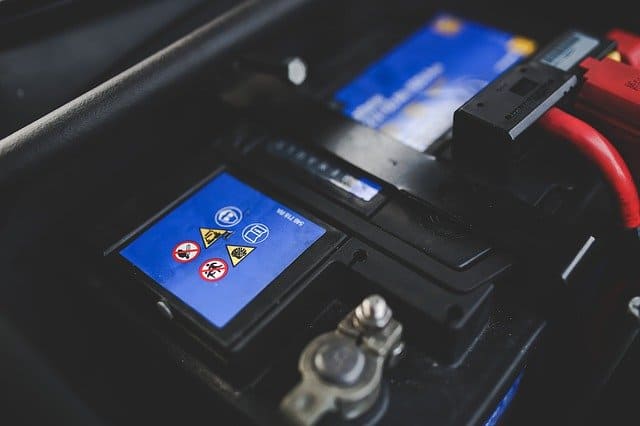Table of Contents
Can A Car Battery Be Overcharged?
Overcharging a car battery can have negative consequences on the life of the battery. But lucky for you overcharging a car battery is not all that common and usually only occurs from a couple of issues that can arise from charging the battery.
The short answer is yes, you can overcharge a car battery. Car Batteries will take whatever voltage is being sent to them regardless of if they are already fully charged. That’s why it’s up to your car’s alternator to only send a certain voltage to the battery.
So what can cause your battery to become overcharged then? What steps can you take to find out if your battery is being overcharged? Keep reading to find out.
What Can Cause An Overcharged Car Battery?
Defective Alternator
The alternator on your car is designed to produce electricity that is then sent to your car battery to keep it charged. Alternators are equipped with a voltage regulator that is designed to regulate the voltage coming from your alternator to your battery. If this voltage regulator malfunctions it can allow additional voltage to be sent to the battery which can overcharge the car battery.
Voltage regulators are designed to keep the voltage being sent to the battery below 14.8 volts. Any voltage over 14.8 volts can overcharge the battery and damage it over time. Signs that your car battery is being overcharged are that it is hot to the touch and the top may begin to swell up.
Trickle Chargers Left Unattended
Another common cause of an overcharged battery is trickle chargers. Trickle chargers as the name suggests provide a small amount of electricity that is fed to the car battery that allows the battery to slowly charge over time. If left unattended trickle chargers can overcharge a car battery by charging the battery above 12.6 volts.
Cell phone chargers are intelligent enough to detect when your cell phone is fully charged and can then stop sending electricity to the phone battery. However, some trickle chargers aren’t able to detect when a battery is fully charged to stop sending electrical energy to it.
If you are planning to buy a battery charger or trickle charger I’d recommend buying one that can determine when the battery is fully charged that way you don’t risk overcharging your battery.
This Black and Decker battery charger and maintainer (link to Amazon) can detect when the battery is fully charged and then can switch to a float mode will then monitor the battery voltage. If the battery voltage drops below a certain threshold the battery charger will turn back on and charge the battery until it is fully charged again.
How Do You Know When A Car Battery Is Fully Charged?
While car batteries are larger than most batteries you would use to power your electronics a car battery is really just a big 12-volt battery. This means that if the car battery is fully charged it should read just over 12 volts (12.6) if the battery is fully charged when the car is off.
You can read the voltage from your car battery while the car is running but you are really measuring that your car’s alternator is working properly when you measure the voltage from the battery while the car is running. While the car is running you should get a higher voltage reading which should be in the range of 13.6 to 14.6 volts.
Most newer car battery chargers will be able to read the volts coming off of your battery and will light up when they detect that the car battery is fully charged. This is convenient because you don’t have to break out a multimeter to read your car battery voltage, you can just let the battery charger tell you when the battery is fully charged.
How Do You Check Your Alternator and Battery For Overcharging?
To check your car battery for overcharging you will first need to obtain a multimeter if you currently don’t own one. Once you have a multimeter on hand you will need to start up your car to allow the alternator to begin to charge your battery. Since you will be working under the hood while your car is running it’s important to steer clear of any moving parts like your radiator fan.
Pop open the hood on your car and locate the battery and battery terminals. Next, you will want to set your multimeter to DCV or DC volts and set the multimeter to a setting above 15 volts, on my multimeter I set it to DCV 20 for 20 volts.
You would then connect the red wire from the multimeter to the red or positive terminal on your battery. The black cable coming from your multimeter would then go to the black or negative terminal on your battery.
From there you would want to look at the readout from your multimeter to determine if it’s overcharging the battery. If you have a reading of over 14.6 volts (14.8 volts or above) then the battery is being overcharged.
A reading anywhere from 13.6-14.6 volts means your alternator is functioning properly. On the flip side if you have a reading below 13.6 volts this means that your alternator is not putting out enough charge to effectively charge the battery.
How Long Should You Charge A Car Battery?
The time it will take to charge a car battery will be mainly dependent on the amperage that your car battery charger is rated. Most car batteries will have a capacity of 48 amp-hours.
This means that if you have a 2 amp battery charger it would take you 48 hours to charge your car battery. If you have a 4 amp battery charger it will take you 12 hours to fully charge your car battery if it’s completely dead.
What Happens If You Leave A Car Battery Charger On Too Long?
If you leave a car battery charger on your car for too long it can damage your car battery rendering it useless. A typical car battery is a lead-acid battery. This means the battery contains acid inside the battery which reacts with the lead plates to be able to store electrical energy.
If you leave a car battery charger on a car battery for too long it will overcharge the battery and cause the acid inside the battery to evaporate which will cause your battery to no longer to hold a charge.
Most car battery charger manufacturers have got around this issue by making their car battery chargers smart enough to tell when a car battery is fully charged.
Once the car battery charger detects that the battery is fully charged it can then stop supplying electricity to the battery which prevents the battery from being overcharged.
Why Do You Need To Charge A Battery?
Storing vehicles over the winter can be hard on their battery if the vehicle is not periodically started to allow the battery to charge. If you plan to store a vehicle with a battery for a long period or over the winter months you may want to use a battery charger/maintainer to charge the battery while it’s not being used. That way you don’t risk the battery freezing over the winter months and it’s not dead the next time you go to use it.
New car batteries may also need to be charged before they are used which is another common reason why a battery may need to be charged. As batteries sit on shelves waiting for people to buy them they will slowly lose their charge. If the battery sits on the shelf long enough it may have lost a significant level of charge which will make it weak when it’s ready to be used
Alternators are only designed to top off the charge on a battery, they aren’t designed to charge a battery that has lost most of its charge. Allowing your alternator to charge up a dead battery is hard on the alternator which is why some people may need to charge their battery before use.
Related Questions
Can You Leave A Car Battery Charger On Overnight? Yes, you can leave a car battery charger on a car battery overnight as long as it is intelligent enough to tell when the car battery is fully charged and then will stop charging the battery.
How Long After Jumping A Car Should You Let It Run? After you jump a car you don’t want to turn off your car for a while. You want to allow your alternator to charge your car battery that way the next time you go to start your car the battery will have enough charge to get it started without needing a jump again.
Does Revving the Engine Charge the Battery? Revving your engine won’t charge your car battery any faster than letting the car idle. Your car’s alternator is designed to provide a specific voltage to the car battery (13.6 to 14.6 volts). If the alternator put out a voltage above this range it would risk damaging the car battery.
Alternatively, if the alternator put out a voltage below the 13.6-14.6 volts it wouldn’t be able to provide enough volts to keep the car battery charged which is also not good for your car. An undercharged car battery means your car likely won’t start the next time you go to fire it up.
What Makes A Battery Explode? Car batteries are designed to be safe to use under normal conditions without exploding. Typically the only times a battery will explode is if the battery leads have been crossed or the battery has been subjected to a blow from an outside force (in the event of a car crash). Under normal operation and conditions, you don’t have to worry about a battery exploding.
Battery explosions have become more frequent since the introduction of Teslas and their multitude of batteries that are used to propel their cars. In the event of a crash, an electric vehicle will be more likely to have a battery explosion because of the sheer number of battery cells that are used.
Can A Car Battery Explode While Driving? While a car battery could explode while driving the risks of this happening are very low. I’ve only heard of car batteries exploding in a crash or when someone was trying to jump the car and accidentally mixed up the positive and negative terminals.

